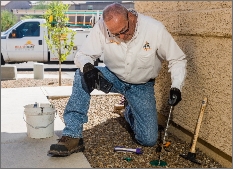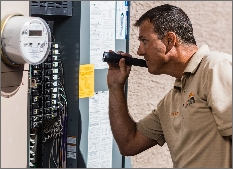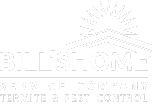Africanized Bees
Africanized honeybees were developed in Brazil in the 1950’s in an attempt to increase honey production. The goal was to cross-breed African honeybees, which were known to be sturdier, but more aggressive due to the climates from which they evolved, with the less aggressive and domesticated European honeybees. However, 26 African queen bees were accidentally released in 1957 and began to produce a new hybrid population with feral bees in Brazil. Since that time, they aggressively made their way up South America and Central America. Africanized honeybees were first reported in Arizona around 1993 and can now be found throughout the state. Studies out of the University of Arizona suggest that nearly 100% of the feral honey bee population in Southern Arizona are Africanized bees. More recent research suggests that Africanized bees are beginning to take over our native pollinators and change our ecosystem.
Africanized honeybees are extremely aggressive defenders of their colonies. While their colony might send a couple of dozen bees to attack a threat, an Africanized honeybee colony will send hundreds. Although the venom of an Africanized honeybee sting isn’t any more potent than the European honeybee, the number of potential stings is what can make their attacks deadly. Africanized honeybees tend to be more sensitive to noises and have a larger alarm zone than European honeybees. Africanized honeybees are also known to pursue a threat over a greater distance than European honeybees—sometimes more than a quarter of a mile from their hive.” Due to their aggressive behavior, the State of Arizona has deemed feral honeybee colonies a public nuisance, and dangerous to public health and property owners are responsible for having the bees treated. Never attempt to treat a bee colony on your own. Always call a professional bee control specialist that has the skills and knowledge to properly control the colony and reduce the risk to the public.
What to do if you’re attacked?
If you are ever attacked by bees you should immediately run in a straight line while trying to cover your face for the nearest shelter such as a car, house, or building of any kind and close the door behind you. Try not lead the bees toward other groups of people if possible. Never jump into a pool or other body of water as the bees will hover over you waiting for you to resurface. Once safely inside, proceed to remove as many stingers as possible using a credit card or something similar to scrape them away. Avoid squeezing the stinger with tweezers as this can squeeze more venom into you. If you are experiencing any symptoms of an allergic reaction call 911 immediately.*
*Disclaimer: The content about bee and wasp sting treatments is for informational purposes only and is not intended to be a substitute for professional medical advice, diagnosis or treatment. Always seek the advice of a medical professional with questions you have regarding pest stings/bites and/or allergic reactions.



